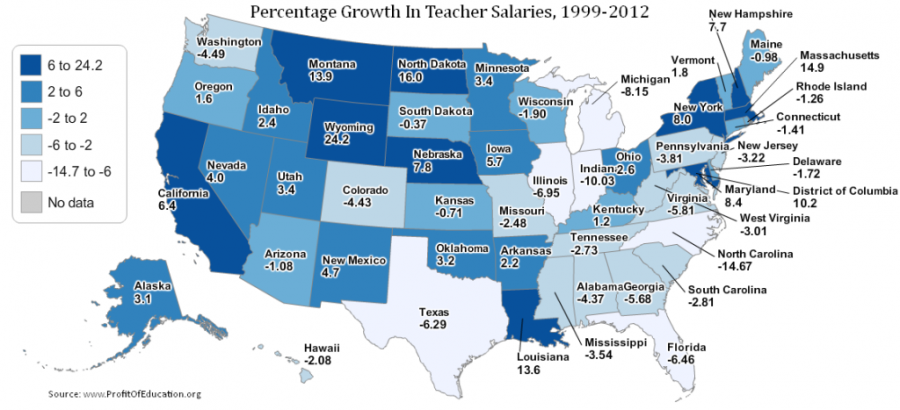Low Salaries Impacting Quality of Education
Infographic via profitofeducation.org
Across the country, teachers have been speaking out, walking out, and striking in protest of low salaries. Teachers are forced to change schools, find a second (or even third) job, or leave the K-12 education community. The South Bend Community School Corporation [SBCSC] has not been left untouched by these changes. Recently, teachers have been become increasingly vocal about the issues surrounding their salaries. Several teachers spoke out at the September 17th School Board meeting, making their hopes and expectations for salary adjustments in the 2019 budget negotiations quite clear. It’s become increasingly obvious that teachers are no longer willing to settle for subpar salaries, and are using their voice to affect change.
Benjamin Kase is a young math teacher, beloved by students across the board. For the past four years, Kase worked at Adams, teaching a variety of Algebra and Geometry classes and even being named Adams’ Teacher of the Year 2017-18. However, in the spring of 2018 he was offered a position in the Elkhart School Corporation, and accepted it. “There were a couple of reasons why I left, the main one though did have to do with salary,” he commented. Kase, despite seven years of teaching experience between Las Vegas and South Bend, faced issues with the “frozen salary” policy while at Adams, which kept him at starting teacher pay. “I just had a newborn son two months ago, so we’re looking for just another way to get more income. A lot of teachers […] take on two or three jobs outside of school to get that extra money; luckily, because of my experience and because of my new masters degree, I was able to get a pretty significant pay bump when I switched over to Elkhart,” he described, explaining his motivation for leaving the corporation.
Kase strongly emphasized the systemic basis of this issue, and the changes that must be made at the state and even national level, not just within the individual corporations. “It’s a tough issue because it’s not a local issue,” he explained. “Indiana is a pretty conservative state, so with the voucher system we’re losing a lot of money. Money follows the students, and South Bend is currently losing more and more students every year. We lose the students, we lose the funding, which means we don’t have the money to pay teachers or provide the resources that teachers need.” The politics between public versus private schooling is not the only contributor to this predicament. “A lot of people too also feel that teachers don’t deserve more money. They see us taking time off during the summers and having fall break, spring break, winter break, they say that we are getting paid just what we deserve for how much we’re working, I think that’s a dangerous idea to have, because we spend a lot of time during the summers and during breaks preparing or sometimes just catching up from what we were doing during the school year, that’s stuff that people don’t see and that’s also part of our job.”
The Adams community is not complacent in letting these salary issues amount further. Three department heads and teachers, Randy Ebright (Language Arts), Cecilia Stanton (Foreign Language), and Joseph Hardman (Math), all made their concerns known at the September 17th board meeting, speaking for themselves as well as all of their colleagues facing the same issues. Kase is still directly involved with these former colleagues, as he believes the outspoken teachers “absolutely” are making a difference. “If it’s not a direct impact with the school board, it’s at least raising awareness and getting the word out there that we’re not the only ones and we’re going to start coming out in numbers. I’m proud to say that I know a lot of those teachers. […] They have the guts to get up and say what a lot of us wanted to say. It’s great that they’re getting the message out,” he commented.
The longstanding issue of low salaries obviously has the greatest impact on the educators. However, the students are not left unaffected. “Number one impact on student achievement is the teacher, and if you are losing your best teachers it doesn’t matter how many Ipads or Chromebooks or how much money you’re spending on other resources,” says Kase. In essence, the students are being affected by the corporation’s inability to pay their best teachers a living wage. Students are motivated by good, inspiring teachers, and if these influential educators are forced to find work elsewhere, the students and schools will potentially face drops in achievement.
Educators are so often portrayed as selfless mentors, doing everything for their students. Many often say that their only reason for teaching is the love of the job, the accomplishments of their students. However, this is changing, as the salary issues become dire. Teachers are forced to place their financial needs over their career preferences in order to support their families, as Kase did by transferring to Elkhart, despite being an Adams alum and Teacher of the Year. His exit carries weight and meaning in the corporation. “I think the timing is sending a message because of my accomplishments last year and the impact that I had at Adams as Teacher of the Year and being in the top ten teachers in the corporation and leaving on that high note. I think that those teachers can help to use me as leverage, saying ‘Hey, this was who we voted as our top teacher and now he’s gone because of this,’ and they’re able to use that as an example. It wasn’t my intention to do that but I’m hoping that they can use that as a catalyst for that change. We’ll see what happens.”
There will be a SBCSC school board meeting on Monday, October 8 open to the public. More teachers, students, and parents are preparing to make their beliefs clear in regards to salaries. With the 2019 budget agreements approaching, teachers will stay relentless and determined to get the salaries they believe they deserve.
Your donation will support the student journalists of The Tower and John Adams High School. Your contribution will allow us to purchase equipment and cover our annual website hosting costs.

Claire Stowe, an Adams senior, is Editor-in-Chief of The Tower, her second year with the position. She has covered a variety of topics as a reporter, including...









Paul Walker • Oct 4, 2018 at 10:55 pm
Claire,
Great article! Very well written. Unfortunately, this is the current state of education in Indiana. The teachers are not trying to make “news” they just want to protect present teachers in the district.
Great job!
Paul Walker
Intro To Communications Teacher
John Adams HS
Joe Crimmins • Oct 4, 2018 at 5:12 pm
Claire, great job on this story. Mr Kase hits it on the head that this issue is really beyond the SB school administration and school board. I believe if Dr. Spells and the board could bump teachers pay they would in a heartbeat. Changes need to happen at the polls. If any teacher reading his lives in Indiana House District 5 (Mishawaka and Granger) you can make a difference by voting for Dr. Don Westerhausen (votewesterhausen.com ) who has received the endorsement of the Indiana State Teachers Association. He is pro-pubic schools and would like to see a halt to vouchers as well. If you don’t live in this district but have friends that do encourage them to vote as Dr. Don Westerhausen’s vote in the Statehouse will impact ALL citizens not just in his district. It was a sad day for me to hear that Mr. Kase was leaving the school district let alone the Eagles Nest. Keep up the great journalism.